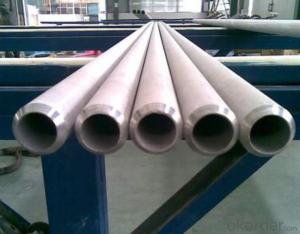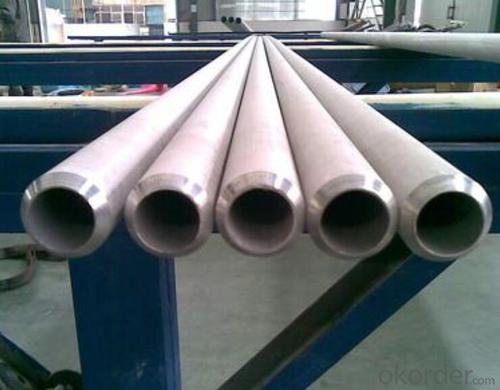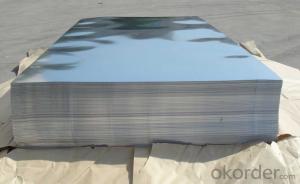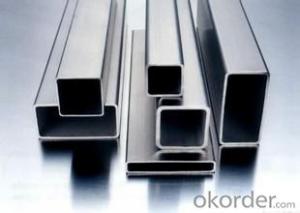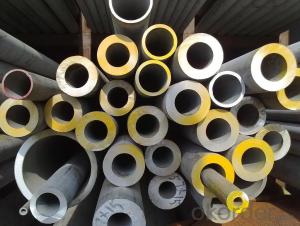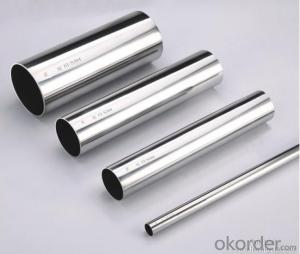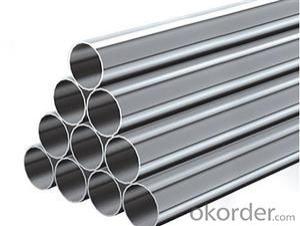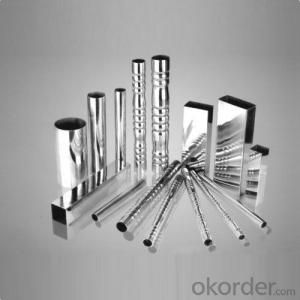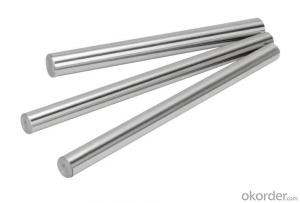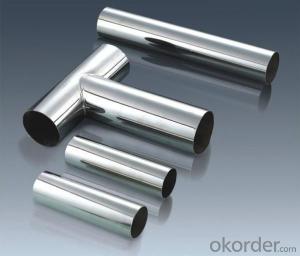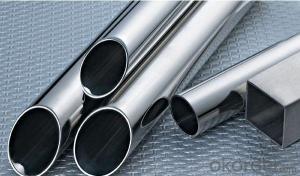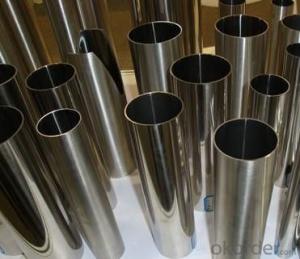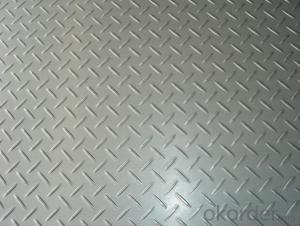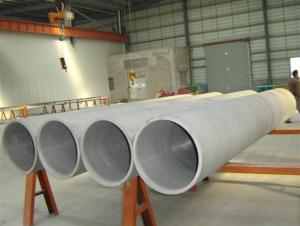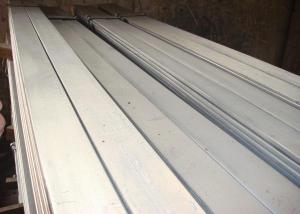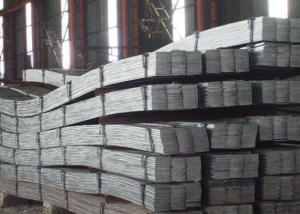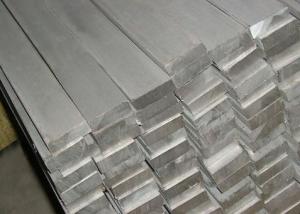Stainless Steel Pipe 304
- Loading Port:
- China Main Port
- Payment Terms:
- TT or LC
- Min Order Qty:
- 25-35 kg
- Supply Capability:
- -
OKorder Service Pledge
OKorder Financial Service
You Might Also Like
Quick Details
| Standard: | JIS,AISI,ASTM,GB,DIN,CE | Place of Origin: | Guangdong China (Mainland) | Brand Name: | QX |
| Model Number: | 201/202/304/316/316L/430 | Type: | Welded | Steel Grade: | 300 Series |
| Application: | Decoration,construction, upholstery | Certification: | ISO | Welding Line Type: | ERW |
| Thickness: | 0.3mm to 3.0mm | Outer Diameter: | 9.53mm to 159mm | Polish: | Satin,Bright or Mirror |
| Grade: | 201,202,301,304,316,316l,430 ect. | Length: | In gernal 5.8m/6m or as customer request | Process method: | Hot rolled |
| Test: | Squash test, water pressure test,extended test,crystal rot test etc. | Production Standard: | ASTM A554 | Materials: | SUS 304, 201, 316, 316L,430 ect |
| OD tolerance: | + / - 0.15mm | Thickness tolerance: | +/- 10% | Length tolerance: | +/- 10mm |
Packaging & Delivery
| Packaging Detail: | Every tube is sleeved in plastic bag individually, and then several tubes are packed by weaving bag, which is seaworthy. Or 50kg/bundle, 500kg/bundle.We can pack as clients' requirement. |
| Delivery Detail: | 25 - 35 days for a full container. |
Specifications
Stainless Steel Pipe:
1.201,202,301,304,316L,430,etc
2.OD:6mm-159mm
3.Thickness:0.25mm-3.5mm
4.Finish:Mirror,Satin,Hairline
Stainless Steel Pipe 304 Image
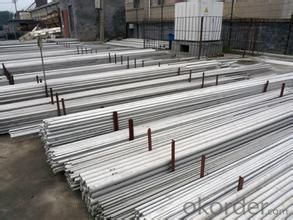
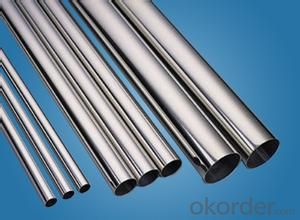
FAQ of Stainless Pipe 304
①How is the quality of your products?
Our products are manufactured strictly according to national and internaional standard, and we take a test
on every pipe before delivered out. If you want see our quality certifications and all kinds of testing report, please just ask us for it.
Guaranteed: If products’ quality don’t accord to discription as we give or the promise before you place order, we promise 100% refund.
②How about price?
Yes, we are factory and be able to give you lowest price below market one, and we have a policy that “ for saving time and absolutely honest business attitude, we quote as lowest as possible for any customer, and discount can be given according to quantity”,if you like bargain and factory price is not low enough as you think, just don’t waste your time.Please trust the quotation we would give you, it is professional one.
③Why should you chose us?
Chose happens because of quality, then price, We can give you both.Additionally, we can also offer professional products inquiry, products knowledge train(for agents), smooth goods delivery, exellent customer solution proposals.Our service formula: good quality+good price+good service=customer’s trust
SGS test is available, customer inspection before shipping is welcome, third party inspection is no problem.
Any question, pls feel free to contact us !
- Q: Are stainless steel pipes suitable for oil and gas applications?
- Yes, stainless steel pipes are suitable for oil and gas applications. Stainless steel is highly resistant to corrosion, making it ideal for transporting and storing oil and gas, which often contain corrosive elements. Stainless steel pipes also have high strength and durability, ensuring they can withstand high-pressure conditions and harsh environments. Additionally, stainless steel is easy to clean and maintain, reducing the risk of contamination in oil and gas operations. Overall, stainless steel pipes are a reliable and cost-effective choice for oil and gas applications.
- Q: Can stainless steel pipes be used in underground installations?
- Indeed, underground installations can utilize stainless steel pipes. The notable attribute of stainless steel lies in its resistance to corrosion, rendering it a fitting choice for underground applications where pipes encounter moisture and other corrosive elements. In addition, stainless steel pipes are renowned for their durability, longevity, and ability to endure high pressure and extreme temperatures. Moreover, stainless steel exhibits resistance to harm caused by movements in the subterranean soil. Henceforth, it stands as a dependable option for underground installations encompassing water and gas supply systems, sewage systems, and industrial pipelines.
- Q: Are stainless steel pipes suitable for high-temperature steam?
- Certainly, stainless steel pipes are well-suited for the transportation of high-temperature steam. Renowned for its exceptional resistance to both heat and corrosion, stainless steel proves to be an optimal choice for applications involving elevated temperatures and steam. The substantial presence of chromium and nickel in stainless steel aids in its ability to endure the corrosive impact of steam, thereby averting oxidation and preserving its structural integrity. Furthermore, stainless steel pipes boast remarkable strength and durability, guaranteeing their capacity to withstand the pressure and strain induced by high-temperature steam. In summary, stainless steel pipes provide a dependable and enduring solution for the conveyance of high-temperature steam across various industries, including power generation, chemical processing, and oil and gas.
- Q: What is the difference between 316 and 316L stainless steel pipes?
- The main difference between 316 and 316L stainless steel pipes lies in their carbon content. Both alloys contain the same amount of chromium, nickel, and molybdenum, which contribute to their corrosion resistance properties. However, 316L stainless steel pipes have a lower carbon content compared to 316 stainless steel pipes. The reduced carbon content in 316L stainless steel pipes helps to minimize the formation of carbide precipitation during welding or high-temperature applications. This process, known as sensitization, can lead to intergranular corrosion, compromising the overall corrosion resistance of the material. By reducing the carbon content, 316L stainless steel pipes are less susceptible to sensitization, making them more suitable for applications where welding is involved. Additionally, the lower carbon content of 316L stainless steel pipes results in improved resistance to corrosion in environments with high chloride exposure, such as coastal areas or industrial settings. This makes 316L stainless steel pipes a preferred choice for various industries, including marine, chemical, and pharmaceutical, where resistance to corrosion is crucial. In summary, while both 316 and 316L stainless steel pipes offer excellent corrosion resistance properties, the lower carbon content of 316L stainless steel pipes provides improved weldability and resistance to sensitization. Therefore, 316L stainless steel pipes are often chosen for applications where welding or exposure to corrosive environments is a concern.
- Q: Under what circumstances can the stainless steel pipe be welded by argon arc, and under what conditions can the arc welding be used?
- The quality of argon arc welding is high, the efficiency is low, the efficiency of SMAW is relatively high, the quality of secondary pipe welding, general thick such as 10mm are TIG welding, welding rod filler cover, if the pipe is thin directly by argon arc welding
- Q: Stainless steel pipe drilling?
- Acid resistant stainless steel is stainless steel, the resistance of air, steam, water and other weak corrosive medium or with stainless steel known as stainless steel; while the resistance to chemical corrosion (acid, alkali and salt chemical etching) corrosion of steel called acid resistant steel. Because of the difference in the chemical composition of the two, and make their corrosion resistance is different, ordinary stainless steel is generally not resistant to chemical medium corrosion, and acid resistant steel are generally stainless steel.
- Q: Can stainless steel pipes be used for nuclear waste storage?
- Indeed, nuclear waste storage can make use of stainless steel pipes. Due to its exceptional resistance to corrosion, stainless steel proves to be an optimal material for the containment and transportation of dangerous substances like nuclear waste. The durability, strength, and capability to endure extreme temperatures of stainless steel render it apt for the prolonged storage of radioactive waste. Furthermore, stainless steel remains non-reactive and prevents the release of harmful substances, thus assuring the preservation of the stored waste's integrity. Nonetheless, it remains crucial to verify that the stainless steel utilized adheres to the specific requirements and standards established for nuclear waste storage to guarantee utmost safety and confinement.
- Q: What is the external coating used for stainless steel pipes?
- The external coating used for stainless steel pipes can vary depending on the specific application and requirements. However, one commonly used external coating for stainless steel pipes is a layer of epoxy or polyethylene. This coating provides protection against corrosion, abrasion, and other environmental factors. It helps to extend the lifespan of the pipes and ensures their durability in various industries such as oil and gas, chemical processing, and water distribution. Additionally, this coating can also be used for aesthetic purposes, providing a smooth and visually appealing surface finish.
- Q: What are the different grades of stainless steel pipes?
- There are several different grades of stainless steel pipes available, each with its own unique properties and applications. The most commonly used grades include: 1. Grade 304: This is the most widely used stainless steel grade for pipes. It offers excellent corrosion resistance, good heat resistance, and high strength. Grade 304 is suitable for a wide range of applications, including water pipes, food processing equipment, and architectural structures. 2. Grade 316: This grade is known for its superior corrosion resistance, particularly in environments with high chloride content. Grade 316 pipes are often used in marine applications, chemical processing plants, and medical equipment where resistance to pitting and crevice corrosion is crucial. 3. Grade 321: This grade is stabilized with titanium, which makes it resistant to intergranular corrosion after exposure to high temperatures. Grade 321 pipes are commonly used in applications involving elevated temperatures, such as exhaust systems, furnace parts, and heat exchangers. 4. Grade 409: This grade is specifically designed for high-temperature applications such as automotive exhaust systems. It offers good heat resistance and is highly resistant to corrosion and oxidation. 5. Grade 904L: This grade is a highly alloyed austenitic stainless steel that provides excellent resistance to a wide range of corrosive environments, including sulfuric acid, phosphoric acid, and chloride solutions. Grade 904L pipes are often used in chemical processing plants, pulp and paper industry, and desalination plants. It is important to select the appropriate grade of stainless steel pipe based on the specific requirements of your application to ensure optimal performance and longevity.
- Q: What are the different grades of stainless steel used for pipes?
- The different grades of stainless steel used for pipes include 304, 316, 321, and 347.
Send your message to us
Stainless Steel Pipe 304
- Loading Port:
- China Main Port
- Payment Terms:
- TT or LC
- Min Order Qty:
- 25-35 kg
- Supply Capability:
- -
OKorder Service Pledge
OKorder Financial Service
Similar products
Hot products
Hot Searches
Related keywords
